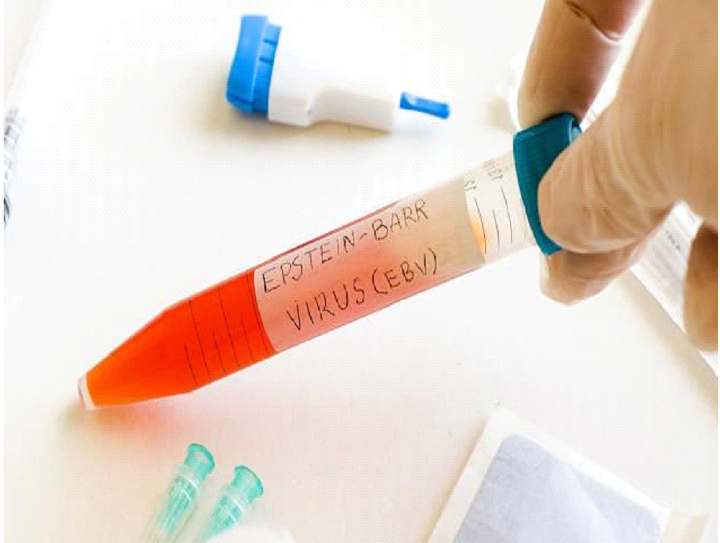
 Data Structure
Data Structure Networking
Networking RDBMS
RDBMS Operating System
Operating System Java
Java MS Excel
MS Excel iOS
iOS HTML
HTML CSS
CSS Android
Android Python
Python C Programming
C Programming C++
C++ C#
C# MongoDB
MongoDB MySQL
MySQL Javascript
Javascript PHP
PHPPhysics
Chemistry
Biology
Mathematics
English
Economics
Psychology
Social Studies
Fashion Studies
Legal Studies
- Selected Reading
- UPSC IAS Exams Notes
- Developer's Best Practices
- Questions and Answers
- Effective Resume Writing
- HR Interview Questions
- Computer Glossary
- Who is Who
What is the full form of EBV?
Epstein-Barr Virus
Epstein-Barr virus (EBV) is a common virus that contaminates people and is a part of the herpes contamination family. It is known to cause a number of sicknesses, including irresistible mononucleosis, as well as being connected to certain sorts of cancers and immune system disorders.

EBV is primarily transmitted through saliva, and most individuals are infected with the virus at some point in their lives. While numerous individuals with EBV may have no symptoms or only gentle symptoms, some can create serious complications. There's currently no specific treatment for EBV, but steady care can help oversee side effects symptoms side effects indications and complications.
Human herpesvirus 4
Human herpesvirus 4 (HHV-4) is the logical name for the Epstein-Barr virus (EBV), which is a member of the herpes virus family that contaminates humans. HHV-4 or EBV is one of the most common infections worldwide and is known to cause infectious mononucleosis, as well as being related with a few types of cancers and autoimmune disorders. Like other herpes infections, HHV-4 remains in the body for life once an individual is infected, in spite of the fact that most individuals with the virus have no symptoms or only mild symptoms. HHV-4 is primarily transmitted through saliva, and there is currently no particular treatment for the infection, but strong care can offer assistance to manage symptoms and complications.
Infectious mononucleosis
Infectious mononucleosis, also known as mono or the "kissing disease", is a common viral ailment caused by the Epstein-Barr virus (EBV) or human herpesvirus 4 (HHV-4). The infection is spread through saliva and can also be transmitted through other bodily fluids, such as blood or semen. The symptoms of mono typically include fever, sore throat, swollen lymph nodes, fatigue, and muscle aches, and can last for a few weeks or months.

Mono is usually a self-limiting sickness that resolves on its own with rest, fluids, and over-the-counter torment relievers. However, some individuals may experience more severe indications, such as liver aggravation or an extended spleen, which can lead to complications. Treatment for mono regularly includes managing symptoms and avoiding contact sports or other strenuous activities to prevent the risk of spleen rupture.
Lymphoma and other malignancies
Epstein-Barr virus has been associated with a few malignancies, including lymphomas such as Burkitt's lymphoma, Hodgkin's lymphoma, and non-Hodgkin's lymphoma. It has moreover been linked to other cancers such as nasopharyngeal carcinoma and certain types of stomach cancer. The virus can cause hereditary changes in tainted cells that can lead to uncontrolled cell development and tumour formation. However, it is important to note that not all individuals contaminated with Epstein-Barr infection will create cancer, and other components such as hereditary inclination and natural exposures may moreover play a part in the advancement of these malignancies.
Conclusion
In conclusion, Epstein-Barr virus is a common human herpesvirus that can cause a range of illnesses, including infectious mononucleosis and several types of cancer. While numerous individuals are infected with the infection at a few points in their lives, most cases are asymptomatic or result in mild sickness. However, in a few cases, especially in people with weakened immune systems, the infection can cause serious illness and even death. Research into the virus and its related illnesses is continuous, and modern treatments and preventative measures are being created to assist moderate the effect of this broad pathogen on worldwide health.
FAQS
Q1. Could EBV lead to cancer?
Ans: Yes, EBV is linked to a number of cancers, including nasopharyngeal carcinoma, Hodgkin's lymphoma, and Burkitt's lymphoma.
Q2. Does there exist a treatment for EBV?
Ans: EBV cannot be cured, but the majority of cases don't need any special care and go away on their own in a few weeks. In more severe cases or in people with compromised immune systems, treatment can be required.
Q3. How may EBV be avoided?
Ans: Although it can be challenging to completely prevent EBV, taking precautions like maintaining excellent cleanliness, avoiding contact with infected people's saliva, and keeping your immune system strong may help lower the risk of infection. Vaccines are being created right now and might be accessible in the future.

